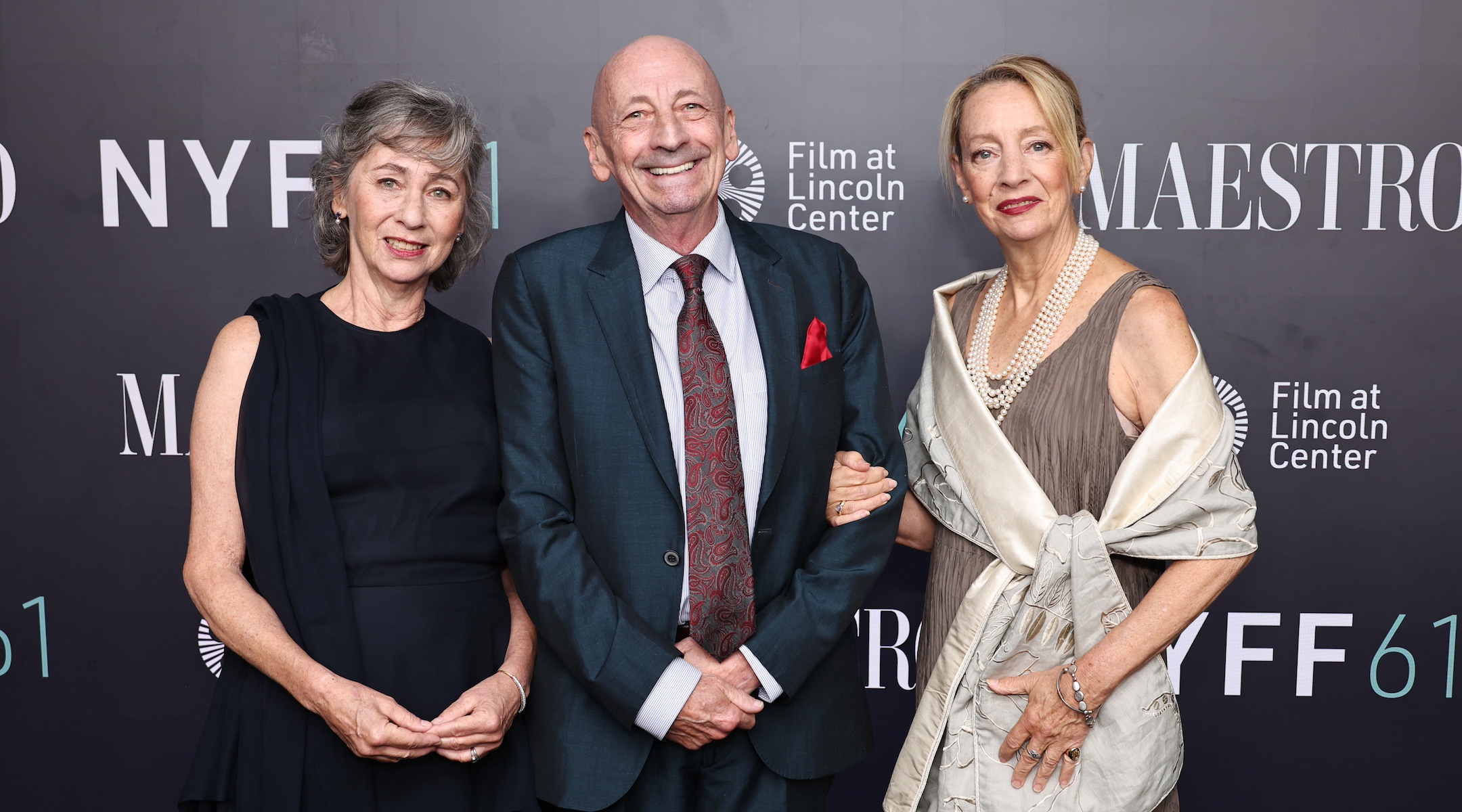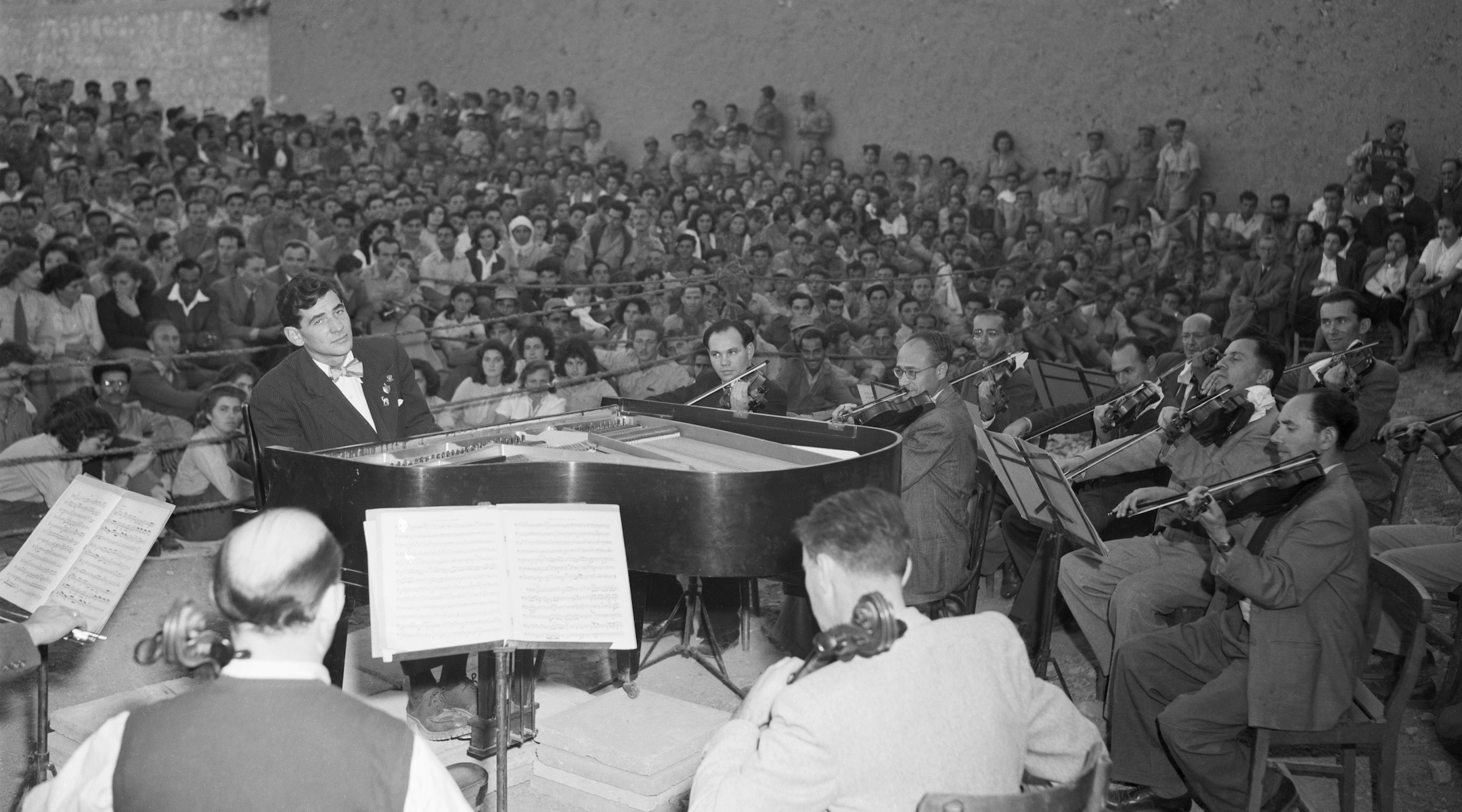The Leonard Bernstein biopic ‘Maestro’ has been plagued by ‘Jewface’ controversy. Many Jewish fans don’t care.
At the film’s New York premiere, fans cared more about star and director Bradley Cooper’s plot lines than his prosthetic nose

Carey Mulligan and Bradley Cooper in “Maestro.” (Netflix)
NEW YORK (JTA) — Like many other fans heading into Monday night’s New York Film Festival screening of “Maestro,” Alexander Gorlin was aware of the “Jewface” controversy that has plagued the film.
But acting is a “cross cultural” exercise, said Gorlin, who is Jewish. His architectural firm has designed several Jewish houses of worship.
“If you’re talented enough to play the role, you should do so,” Gorlin told the Jewish Telegraphic Agency in the lobby outside of Lincoln Center’s David Geffen Hall. “You’re not limited by your birth identity. The greatest actors are the ones who transcend that.”
“Maestro,” a biopic about Leonard Bernstein starring and directed by Bradley Cooper, took heat for months over its non-Jewish star’s use of a prosthetic nose. Online discourse was so intense that Bernstein’s three children issued a statement defending Cooper, saying he included them in “every step” of the production process. The makeup artist who created the prosthetic apologized for hurting people’s feelings. Even the Anti-Defamation League got involved.
But the atmosphere in the David Geffen lobby between the film’s two screenings on Monday night — which marked the film’s North American premiere — was light and celebratory. Granted, many in attendance were avowed fans of Bernstein, Cooper and classical music. Still, most were well read on the details of the nose controversy and decidedly over it.
“I thought it was appropriate and I have no problem. The nose seemed right for the movie,” said Scott Drevnig, who is Jewish and is the deputy director of the historic Glass House in Connecticut. He spent a large chunk of the screening that he attended trying to figure out if Cooper was sitting directly in front of him (he was).
Many ticket holders were more occupied with other aspects of the film and its plot, which focuses heavily on Bernstein’s marriage to actress Felicia Montealegre. Even though the two had an understanding about Bernstein’s love life and a genuine romantic connection, their relationship strains under the weight of Bernstein’s many gay affairs and his scrutiny in the public eye.
“I grew up loving Bernstein, and it felt totally fine,” Greg Outwater, who is not Jewish and works in fundraising for Northwestern University, said about the prosthetic nose. “I thought it was going to be a little bit more about the music and his conducting, that’s the only thing that I wasn’t expecting.”
Sarah Silverman, who a few years ago was one of the voices who helped amplify the “Jewface” criticism of non-Jewish actors playing Jewish characters, co-stars in “Maestro,” as Bernstein’s sister Shirley. Silverman hasn’t been able to publicly comment on the film due to the ongoing actor’s guild strike.

Leonard Bernstein and Felicia Montealegre’s three children, from left, Nina, Alexander and Jamie, at the New York Film Festival screening of “Maestro,” Oct. 2, 2023. (Jamie McCarthy/Getty Images for FLC)
The film makes Bernstein’s Jewish identity clear early and often. At the party where Bernstein first meets Montealegre, who is played by Carey Mulligan, the two bond over having Jewish parents. Montealegre, who was born in Costa Rica and raised in Chile, had a Jewish American father.
As Bernstein’s career picks up speed, a Russian-Jewish composer tells him he will find much more success if he changes his name to the less Jewish-sounding “Burns” (Montealegre convinces him that it’s bad advice). And later in the film, Bernstein is shown wearing a sweater with Hebrew on it. The movie’s closing credits feature Jewish prayers set to classical music melodies.
Its opening credits feature some of Hollywood’s biggest names as producers, notably Steven Spielberg and Martin Scorsese. Spielberg had hand-picked Cooper to helm the project after watching “A Star Is Born.”
The Spielberg-Cooper bid to buy the rights to use Bernstein’s music ultimately defeated a bid by another prominent Jewish actor: Jake Gyllenhaal.
In 2021, not long after using the bid battle, Gyllenhaal commented on the ordeal to Deadline. “That idea of playing one of the most preeminent Jewish artists in America and his struggle with his identity was in my heart for 20 some odd years,” he said.
That storyline was more disturbing than the nose controversy for Melissa Tomczak, a 24-year-old who works at a literary agency.
“I don’t necessarily think that non-Jewish people can’t play Jewish people or make films about Jewish people,” said Tomczak, who is not Jewish. “But it kind of sucks that [Gyllenhaal] is someone who is a stage actor, and he admires Bernstein, and wasn’t able to make the film.”
Bernstein — who is widely considered the first great American orchestral conductor and who composed music in different genres, from classical to the Broadway style of his “West Side Story” — was very engaged with Judaism throughout his life. In 1963, he wrote a symphony titled “Kaddish,” dedicated to the late John F. Kennedy. He and legendary choreographer Jerome Robbins collaborated on a ballet called “Dybbuk,” based on S. Ansky’s early 20th-century Yiddish play “The Dybbuk.” And after Israel’s Six-Day War in 1967, Bernstein conducted a historic concert on Jerusalem’s Mt. Scopus.

(Leonard Bernstein, behind the piano, plays a recital in the Negev with the Israel Philharmonic, Dec. 6, 1948. (Bettmann/Getty Images)
For Annalise Pelous, a 23-year-old film production coordinator at Monday night’s screenings, the Bernstein family’s embrace of Cooper’s vision went a long way. Jamie Bernstein helped introduce the film at a podium before both screenings, saying almost breathlessly that the audience was “in for a treat.”
“The family was totally fine with it,” Pelous said about the nose controversy. “I don’t know, it’s like … whatever.”
The film as a whole seemed to split Monday’s audience — some found it to be a masterpiece, others found it trite. Many were awed by the way the film’s soundtrack boomed through a specially designed Dolby sound system.
“It felt a little bit hollow. I feel like a lot of the things that Netflix is helping make kind of all have the same look, and I keep waiting for something to break free from that,” Pelous said of the movie. After the film debuts in theaters on Nov. 22, it heads to Netflix on Dec. 20. “But a lot of the music was incredible,” she added.
This article originally appeared on JTA.org.
A message from our Publisher & CEO Rachel Fishman Feddersen

I hope you appreciated this article. Before you go, I’d like to ask you to please support the Forward’s award-winning, nonprofit journalism so that we can be prepared for whatever news 2025 brings.
At a time when other newsrooms are closing or cutting back, the Forward has removed its paywall and invested additional resources to report on the ground from Israel and around the U.S. on the impact of the war, rising antisemitism and polarized discourse.
Readers like you make it all possible. Support our work by becoming a Forward Member and connect with our journalism and your community.
— Rachel Fishman Feddersen, Publisher and CEO


























